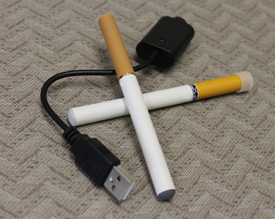 As electronic or e-cigarettes continue to grow in popularity, researchers continue to study this device and how it compares to tobacco treatments that are proven safe and effective according to the Food and Drug Administration and practice guidelines.
As electronic or e-cigarettes continue to grow in popularity, researchers continue to study this device and how it compares to tobacco treatments that are proven safe and effective according to the Food and Drug Administration and practice guidelines.
A recent study published in the Journal of General Internal Medicine (doi: 10.1007/s11606-014-2889-7) by Rutgers Cancer Institute of New Jersey member Michael Steinberg, MD, MPH, FACP and colleagues at Rutgers University and Pennsylvania State University compared the e-cigarette with the FDA-approved nicotine inhaler in terms of perceived benefits, harms, appeal, and role in assisting with smoking cessation. Dr. Steinberg, who is also the director of the Tobacco Dependence Program (supported by the Cancer Institute of New Jersey, School of Public Health and Robert Wood Johnson Medical School at Rutgers) shares more about the research:
Q: How was the study structured?
A: The study included about 40 cigarette smokers, who had never used the e-cigarette or the nicotine inhaler. They were given each device to use for a three-day period and then asked to rate the products in terms of satisfaction, imagery, and how helpful they thought each device was in helping them to quit smoking. All responses were documented on a validated survey instrument.
Q: What did you and your colleagues find?
A: The e-cigarette scored consistently higher than the inhaler in all aspects of perceived satisfaction and reward, with similar side effects. E-cigarettes were more acceptable, had a “cooler” image, and were felt to be more helpful in smoking cessation. Despite a lack of evidence regarding safety and effectiveness, over three-quarters of participants said they would use the e-cigarette to quit smoking compared to less than one-quarter for the FDA-approved nicotine inhaler.

Q: Why is this research important?
A: With tobacco use cited as a main risk factor in the development of lung cancer and other major illnesses, researchers and clinicians continue to build on a collection of tools and therapies that will aid in cessation efforts. As one of the most trusted sources of health information, physicians and other healthcare professionals are going to be asked more and more about e-cigarettes. As treatment providers, we need to figure out how these devices have become so popular and apply this to proven treatments.
Q: What are some of the concerns involving e-cigarettes?
A: In addition to concerns over individuals’ use of e-cigarettes, public health professionals warn of the potential appeal of flavored e-cigarette “juice” or vapors to young people, and the possibility that e-cigarettes might deter smokers from quitting completely.
Q: Is there enough information on e-cigarettes to incorporate their use in smoking cessation therapy?
A: Despite the e-cigarette’s appeal and popularity, regulation of these products is still non-existent, and there is still not enough data on their safety and efficacy to recommend them as a cessation tool.
This study was funded by Rutgers Cancer Institute of New Jersey (P30CA072720).

